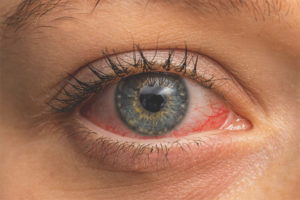The content of the article
Many people know firsthand the condition in which it darkens sharply in the eyes and dizziness occurs. Immediately determine the cause of this phenomenon is difficult. Therefore, when these signs are manifested, you should consult a general practitioner, and if necessary, he will refer the patient to a narrowly specialized specialist, for example, a neurologist or cardiologist.
For some, the duration of such an attack does not exceed several seconds and is explained by the usual overwork. In others, such a reaction of the body indicates serious violations in its functioning.
Why is it getting dark in my eyes and dizzy
These symptoms often arise due to natural physiological processes that occur in the body. The reasons that do not pose a serious danger include the following:
- An increase in the concentration of adrenaline in the blood. This happens when a person gets into a stressful situation, is excited or experiences a strong psycho-emotional shock.
- Long stay on top.
- Compliance with strict diets, as a result of which the body is exposed to an acute shortage of glucose.
- Taking certain drugs - tranquilizers, antibacterial drugs, antiseptic agents.
- Sports training, during which you have to sharply turn your head or body.
In the above situations, in order to eliminate unpleasant symptoms, you need to get rid of the provoking factor. For example, calm down, suspend drug therapy with specific medicines, start eating right. If, subject to these recommendations, no improvement occurs within a week, you should visit a doctor. The doctor will be able to identify the causes of this condition and, if necessary, prescribe the appropriate treatment.
When do you need to sound the alarm?
Its mild form is characterized by symptoms that resemble a fainting condition. There is dizziness, blurred eyes, nausea, a person is afraid to lose consciousness. Sometimes sweating increases, there is a feeling of squeezing in the epigastric region. An attack usually lasts no longer than five minutes.
In disorders of a high degree of severity, psychosensory disturbances appear. The severity of the above clinical manifestations is significantly increased. Lowering blood pressure can cause fainting. This attack lasts approximately 20 seconds.
There are some diseases that are characterized by similar symptoms. Among them:
- Vegetovascular dystonia. With this disease, the patient is dizzy and has a severe headache. The place of localization of the pain syndrome in most cases is the temporal and occipital region.
- Cervical osteochondrosis. The disease is characterized by the appearance of the above symptoms in the morning and evening. The head begins to spin more when it is turned, and also when a person leans in or abruptly changes the position of the body.
- Migraine.In addition to severe headache, the condition is accompanied by dizziness, the appearance of tinnitus, photosensitivity, nausea, and other symptoms.
- Diseases of the inner ear, which are caused by a malfunction of the vestibular apparatus.
- Inflammation of the inner ear. For example, otitis media, in which it lays ears, is sore and dizzy, especially when changing position.
- Traumatic brain injuries.
- Trigeminal neuralgia. A signal about the development of such a disease is a blurred eye. In this case, it is necessary to start therapy as soon as possible, otherwise adverse consequences may develop. Treatment in most cases boils down to the use of antibiotics.
- Oncology of varying severity. With a similar disease in humans, the symptoms in question are observed almost daily.
With constant dizziness and darkening before the eyes, you need to contact a competent specialist. In no case should you let the situation drift and ignore these clinical manifestations. When a comprehensive examination is performed, the doctor will be able to establish the cause of this phenomenon, prescribe the necessary treatment.
Dizziness and blurred eyes - signs of a stroke
A sharp occurrence of dizziness and visual impairment can indicate the development of a stroke, since such symptoms are observed in the first stage. In this case, you can not lose a second - you must immediately call an ambulance.
In addition to the above clinical manifestations, such signs can speak about a stroke:
- squinting eyes;
- problems with speech;
- asymmetry of the face.
Even if at least one of these symptoms occurs, it may already indicate a stroke. The head does not always hurt. If such attacks appear regularly, it is possible to suspect circulatory disorders in the brain. If you ignore this problem and do not take appropriate measures, the consequences can be very sad. In severe cases, a stroke leads to paresis, paralysis, as a result of which a person can remain disabled for life.
What to do?
When a person nearby has symptoms such as darkening in the eyes and dizziness, you must definitely give him first aid. The best thing you can do in this case is to call a team of paramedics, and then carry out the following manipulations:
- If this happened indoors - open the window so that a sufficient amount of oxygen is supplied.
- The victim must be put very carefully, unfasten the clothes that squeeze his body.
- Try to calm down.
- The patient's legs should be slightly raised. So the blood will flow better to the brain.
Some people who fall into such situations know what caused this condition, and can tell what needs to be done. So, a person suffering from diabetes will explain that he did not eat on time. You can help him by drinking sweetened water. Then take measurements of blood sugar using a special device - a glucometer.
What is not allowed to do? When a person has a severe headache, dizziness, veil before his eyes, do not leave him alone. A sharp deterioration in the patient's condition can occur, which can even lead to death. In addition, experts do not advise making attempts to help the victim with the help of improvised drugs. For similar clinical manifestations, it is not always possible to accurately determine the cause of the condition. Self-medication in some cases only leads to lubrication of the symptoms, because of which even the doctor will not immediately be able to understand what happened to the patient. In addition, certain medications can cause allergies, anaphylactic shock, and other side effects.
Diagnostic Methods
A patient who comes to the doctor with complaints of constant dizziness and blurred eyes may be prescribed several diagnostic procedures. The fact is that such symptoms often speak of hidden diseases that need to be urgently treated. To determine the cause of the condition, a comprehensive examination may be required, including such measures:
- Pressure measurements.
- Ultrasound examination of the cervical spine and cerebral vessels.
- Magnetic resonance imaging to detect damage to brain tissue and the development of acute inflammation.
- Encephalography for assessing the state of blood vessels.
- Computed tomography to detect changes in the cervical vertebrae and the development of cancerous tumors.
- Fundus examination and eye pressure measurements.
- General blood test and biochemistry - to determine the blood sugar, cholesterol, hormones, hemoglobin.
- Backseeding and blood sampling to detect infectious and viral diseases that can trigger dangerous brain inflammations.
- Neurological tests - if the development of vegetovascular dystonia and other neurological disorders is suspected.
Treatment
To get rid of dizziness and blurred eyes, you should know the reason, since it is necessary to treat the underlying disease.
It is often enough to make adjustments to the diet, adjust the daily routine, and eliminate the influence of factors that cause such a condition so that the symptoms go away. But if there are dangerous disorders and inflammations, drug therapy will be required. In this situation, the following medications may be prescribed to the patient:
- Anti-inflammatory and antibacterial drugs - for acute otitis media, as well as infections that affect the brain.
- Soothing medicines, antidepressants, as well as medications that normalize blood flow - with vegetative-vascular dystonia, pressure surges, stressful and depressive states.
- B vitamins, calcium antagonists, agents that provide nutrition to the brain - with intellectual overload, hypoxia.
- Physiotherapeutic procedures, massage, medications that normalize the tone - with osteochondrosis and other diseases of the cervical vertebrae.
- Iron-containing preparations with reduced hemoglobin.
- Hormonal drugs - for hormonal imbalances or malfunctions in the activity of the endocrine system.
The duration, dose and treatment regimen are determined by the doctor, taking into account the data obtained during the examinations.
Prevention
It’s much easier to prevent any disease than to cure it. If the head is spinning and darkens in the eyes as a result of physiological changes in the functioning of the body, one should try to correct the lifestyle. To do this, experts advise you to rest more, not to break the mode of work and rest, eat balanced, avoid stressful situations.
If the causes are physiological disorders, preventive measures will be the same. Only they need to be supplemented with the therapy prescribed by the doctor.
Video: what to do with dizziness











Submit